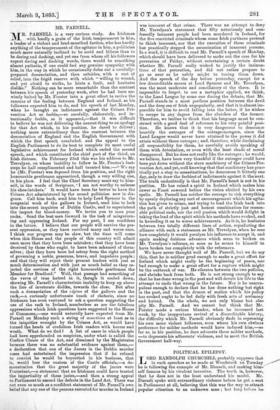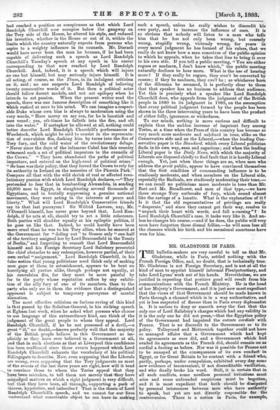POLITICAL EPILEPSY.
LORD RANDOLPH CHURCHILL probably supposes that- in such speeches as he made at Woodstock on Tuesday he is following the example of Mr. Disraeli, and making hi - self famous by his virulent invective. The truth is, however, that he does not in the least understand his model. Mr.. Disraeli spoke with extraordinary violence before he got a -seat in Parliament at all, believing that this was the way to attract popular attention to an unknown man ; but long before he
had reached a position as conspicuous as that which Lord Randolph Churchill now occupies below the gangway on the Tory side of the House, he altered his style, and reduced his invective, whether in the House or out of it, within the limits which the country naturally expects from persons who aspire to a weighty influence in its counsels. Mr. Disraeli would have never been the man he became, if he had been capable of delivering such a speech as Lord Randolph Churchill's Tuesday's speech at any epoch in his career corresponding to that now reached by Lord Randolph Churchill. And, indeed, it is a speech which will injure no one but himself, but may seriously injure himself. It is all acting, of course, as the Times, in its indulgent criticism on it, said ; no one suspects Lord Randolph of believing twenty consecutive words of it. But then a political actor should follow decent models, and not act epilepsy when he intends to act passion. When the present writer read the speech, there was one famous description of something like it which rushed at once to his mind. We can imagine a respect- able Duke whose own bias is always to moderation using the very words, " Have mercy on my son, for he is lunatick and sore vexed ; yea, oft-times he falleth into the fire, and oft into the water." If metaphor be allowed at all, nothing could better describe Lord Randolph Churchill's performances at Woodstock, which might be said to consist in the representa- tion of convulsion fits, dashing him by turns into the fire of Tory fury, and the cold water of the revolutionary deluge. "Never since the days of the infamous Cabal has this country witnessed such a set of political impostors in the councils of the Crown." " They have abandoned the paths of political imposture, and entered on the high-road of political crime." " So base was their policy, that they forced the Crown to rely for its authority in Ireland on the assassins of the Phoenix Park." Compare all that with the wild shriek of real or affected revo- lutionary passion with which Lord Randolph declares,—" They pretended to fear that in bombarding Alexandria, in sending 40,000 men to Egypt, in slaughtering several thousands of Egyptians, and in brutally suppressing a genuine national movement, they were acting in the interests of peace and liberty." What will Lord Randolph's Conservative friends say to that last paroxysm ? Sir Wilfrid Lawson, nay, Mr. O'Donnell himself, has never gone beyond that. Lord Ran- dolph, if he acts at all, should try to act a little coherence. Both parties will shudder equally at his epileptic politics, if he goes on like that. Indeed, he could hardly have been more cruel than he was to his Tory allies, when he sneered at the Government for " doling out " to Greece only " one-half of the territory assigned her by Lord Beaconsfield in the Treaty of Berlin," and forgetting to remark that Lord Beaconsfield himself and his Foreign Secretary Lord Salisbury presented the chief obstacles to any redemption, however partial, of their own verbal "assignment." Lord Randolph Churchill, in his false notion that young politicians need think only of making men gape at them in astonishment, appears to be bent on horrifying all parties alike, though perhaps not equally, at his convulsion fits, for they must be more painful by far to the party whose reputation suffers by any exhibi- tion of the silly fury of one of its members, than to the party who only see in them the evidence that a distinguished opponent is subject to temporary paroxysms of mental alienation.
The most effective criticism on furious raving of this kind is that passed by the Solicitor-General, in his striking speech at Egham last week, when he asked what persons who choose to use language of this extraordinary kind, can think of the judgment of the great people to whom they appeal. Lord Randolph Churchill, if he be not possessed of a devil,—a great " if," no doubt,—knows perfectly well that the majority of the British people believe in this Government as im- plicitly as they have ever believed in a Government at all, and that in such elections as that at Liverpool this confidence has been reaffirmed since those events happened which Lord Randolph Churchill exhausts the vocabulary of his political Billingsgate to describe. Now, even supposing that the Liberals are wrong, even supposing that the Tory judgments on most of the events of the last three years are right, how will it tend to convince those to whom the Tories appeal that they been mistaken, to tell them not merely that they have misjudged matters on which a right judgment is very difficult, but that they have been, all through, supporting a pack of thieves, hypocrites, and imbeciles? That is the thesis of Lord Randolph Churchill's speech, and we cannot for our lives understand what conceivable object he can have in making such a speech, unless he really wishes to discredit his own party, and to increase the influence of ours. It is so obvious that nobody will listen to a man who tells him that he has not only been wrong, but coarsely wrong, stupidly wrong, viciously wrong, for years in every moral judgment he has formed of his rulers, that we really do not know how a man conceives of the public opinion to which he appeals, when he takes that line to bring it over to his own side. If you tell a public meeting, " You are either rogues or madmen, I don't know which," the public meeting naturally declines to hear more. What is the use of hearing more ? If they really be rogues, they won't be converted by reason; if they be madmen, they can't be ; so whichever horn of the dilemma be assumed, it is perfectly clear to them that that speaker has no business to address that audience. Yet this is precisely what a speaker like Lord Randolph Churchill does, who appeals from the judgment of the British people in 1880 to its judgment in 1883, on the assumption that every political judgment formed by the people has been shown in the three intervening years to have been the product of either folly, ignorance, or wickedness.
To our minds, nothing is more curious and difficult to explain than the sudden increase of impotent fury among Tories, at a time when the Press of this country has become so very much more moderate and subdued in tone, alike on the Conservative side and on the Liberal,—when the leading Con- servative paper is the Standard, which every Liberal politician finds, in its own way, sane and sagacious ; and when the leading Liberal paper is the Daily News, with which the majority of Liberals are disposed chiefly to find fault that it is hardly Liberal enough. Yet, just when these things are so, when men who address the great public, appear to have convinced themselves that the first condition of commanding influence is to be studiously moderate, and when members on the Liberal aide, especially the Radicals, are studiously moderating their tone,— we can recall no politicians more moderate in tone than Mr. Burt and Mr. Broadhurst, and men of that type,—we have these strange Tory outbreaks of fury, which sound almost like the ravings of a lunatic. What is the explanation of it I Is it that the old representatives of privilege are really " desperate," and since they cannot get their way, resolve to "unpack their heart with words, and fall a-cursing"! In Lord Randolph Churchill's case, it looks very like it. And un- less he changes his course,—and if he does, the public will very soon have forgotten these dismal follies,—he will soon lose all the chances which his birth and his occasional smartness have won for him.



































 Previous page
Previous page